But in the first case, the child was really frozen and received a "bouquet" due to hypothermia, and in the second, he became infected. As Komarovsky says, a cold is inflammatory process (laryngitis, pharyngitis, otitis media, bronchitis) in the body, arising from the weakness of the immune system. Therefore, a cold has nothing to do with ARVI.
The most common disease caused by a cold in babies, Komarovsky calls tonsillitis. The pediatrician associates its appearance with a weakening of the immune system, therefore, again and again, he recommends to come to grips with hardening the baby from young nails and create optimal living conditions for him.
Komarovsky video: acute respiratory infections, colds
If a child has a cold, Komarovsky, his video can be viewed on the Internet, in addition to treating her symptoms, parents are advised to ensure that the apartment has moist, clean and cool air, the child receives adequate nutrition and a sufficient amount of liquid. If the temperature has passed, then walks in the fresh air are very useful.
According to Dr. Komarovsky, colds and treatment with hot foot baths, cans and mustard plasters are the wrong approach. These are distracting treatments that can be used in tandem with mainstream therapy. And she, in turn, should be aimed at combating the main symptoms: we treat snot, cough, strengthen the immune system. And so that the child has colds as rarely as possible, he must be tempered!
Komarovsky: colds during pregnancy or feeding
No one is immune from colds, even future and young mothers. Often the sore takes them by surprise, and, unfortunately, many are lost, not knowing what to do in such a situation. Some are not treated at all, fearing to harm the child, while others, on the contrary, indiscriminately take medications that they used before pregnancy or breastfeeding. How to treat a cold, Komarovsky told repeatedly in his programs. He advises mothers to be very careful in the choice of drugs and strictly follow the instructions.
Komarovsky video: Why is a cold not contagious?
A cold in a nursing mother, Komarovsky believes, should not be a reason to quit feeding. In this case, colds are treated with homeopathic medicines that are safe for the baby. Yes and folk remedies nobody canceled. A very small amount of drugs enters the milk, so they will not bring any harm to the child. But when taking antibiotics, you will have to stop feeding. If you are overtaken by a cold during pregnancy, Komarovsky advises the same treatment as during feeding.
Komarovsky interview: Cold
| Name | Playback | Duration | ||
|---|---|---|---|---|
| SARS or colds in a nursing mother - Dr. Komarovsky | |
2:38 min | ||
| ARI in a pregnant woman - Doctor Komarovsky | |
2:41 min | ||
| ARI, colds - Doctor Komarovsky | |
2:40 min | ||
| Why isn't the common cold contagious? - Webinar Doctor Komarovsky | |
2:51 min | ||
We strongly recommend that you watch the full video clips online, which are located on the same page. They talk in more detail about the common cold. The article displays the main points that Evgeny Olegovich highlights, which parents should know first of all. In addition, you can read the books of Dr. Komarovsky, where you can emphasize many new and useful things for yourself. More information about the common cold can be found in the books "Medicines. Handbook of sane parents. Part 3. Medicines" (Chapter 2.1.3. Paracetamol) and "ARI: A guide for sane parents".
Information
|
Related materials
|
|
It is well known that many things are contraindicated for a nursing mother. The situation is especially aggravated if she suddenly gets sick with the flu or a cold. In this case, you can often hear that you need to immediately stop breastfeeding, and give the baby milk only in expressed and boiled form. However, this approach is wrong. But then what to do when you have a cold while breastfeeding? How to treat it, and is it dangerous for the baby's health?
Cold or not?
How in most cases does a person understand that he has a cold? Most often, he feels a stuffy nose, a sore throat, general weakness, headache... When these symptoms appear, they usually measure the temperature, and if it turns out to be elevated, it is most likely that it is an acute respiratory viral infection. At least that's what the overwhelming majority of people think so and very often turn out to be right. But in the case of a nursing mother, the situation is complicated.
First, general ailments can be associated with fatigue, lack of sleep, stress, or other reasons. Second, an increase in temperature is not always a sign viral infection... Of course, a high thermometer indicates that some kind of inflammatory process is taking place in the body. But where is it localized and what is it? Only a doctor can answer these questions, and therefore you should not rush and make an independent diagnosis: a cold while breastfeeding. It may be incorrect for the reason that nursing mothers often make mistakes in temperature measurements.
How to measure temperature when you suspect a cold while breastfeeding
Most people are used to measuring their body temperature in armpit... It is simple, reliable, and convenient, but not suitable for breastfeeding mothers. This is because when the mammary gland is full, its temperature rises to 37.3 ° C. This is a normal condition and not a cold when breastfeeding because the milk that forms deep in the tissues is hot. In addition, when it is formed, the muscles, contracting, generate heat. Therefore, thermometer readings are often misinterpreted. What to do?
There are two options: either use other thermometers (for example, oral), or measure the temperature in the usual way, but half an hour after feeding or pumping. However, even in the latter case, you need to be prepared for the fact that the thermometer indicator will be 2-3 tenths of a degree higher.
Reasons for the rise in temperature
If the temperature was measured according to all the rules, and the thermometer still showed a high value, the question arises as to what caused such an increase. Of course, it could be a cold while breastfeeding or even the flu, but there may be other reasons.
For example, if 2-3 weeks have passed after childbirth, and especially if they proceeded with complications, then postpartum inflammatory diseases are most likely to blame - endometritis, suture inflammation, mastitis. Another possible option is exacerbation of chronic infections, such as pyelonephritis or herpes.
But it is just a cold during breastfeeding that worries mothers much less often, because during this period they rarely leave the house, do not go to places of a large crowd of people and do not overcool. But mastitis - inflammation of the mammary gland - is a fairly common occurrence. It can begin both immediately after the birth of the baby, and after a few weeks. The trigger for it is external microbes (most often staphylococci) that enter through cracks in the nipples, or foci of some old infections.
Another likely reason for the appearance high temperature there may be food poisoning. However, in this case, it will also be accompanied by vomiting, diarrhea, or abdominal pain.
Treating the common cold while breastfeeding. Komarovsky recommends
The well-known children's doctor Komarovsky, who hosts his program on television, often refers to the topic of the common cold while breastfeeding. He argues (and many doctors agree with him) that mothers should never self-medicate if they have diagnosed acute respiratory infections. First, the diagnosis may be wrong. Secondly, the treatment is useless. Modern medicine knows exactly what to stop the development of a viral infection folk methods - honey, tea with raspberries and garlic is impossible. Most of the medications for nursing mothers should not be taken either. Therefore, it remains to endure and follow simple recommendations:
- Dress warmly;
- Provide regular ventilation (viruses do not live in moving air);
- Drip salt drops into the nose;
- Drink plenty of any warm liquid.
It is also worth noting that, following the recommendations of Dr. Komarovsky, only those who are 100% sure of the diagnosis of acute respiratory infections will be able to overcome a cold while breastfeeding. Moreover, it should not be established by the patient herself, but by the doctor, who, after the examination, prescribes a course of treatment. The local therapist should be called at the first sign of malaise. He will need to be consulted about what drugs can be taken if the temperature rises too much (above 38.5 ̊С). Most likely, he will advise on antipyretics that can be given to children - Paracetamol and Ibuprofen.
Breastfeeding colds: can I breastfeed?
In many ways, the answer to this question depends on how hard the mother suffers from the disease. If the virus is strong and the body is actively fighting it, then there may be too many pathogens in the milk. As a rule, this happens if the temperature exceeds 38 ° C for a long time. In this case, it is better to temporarily transfer the baby to special mixtures.
3.7 out of 5 (11 votes)Recently, the position of doctors regarding the use of medicines when breastfeeding has changed. Previously, any use of tablets during lactation was prohibited. Now the opinion of experts has become more flexible. When treating ARVI, feeding can be continued.
The onset and course of the disease
ARVI - acute respiratory disease... It is caused by viruses and transmitted through the air. A sick person becomes the source.
Communication and even being close to the patient can lead to infection. A breastfeeding woman remains a member of society, so the risk of illness remains as high for her. In addition, the immunity of a nursing mother is often weakened after pregnancy and childbirth.
Incubation period
Most viral diseases have an incubation period. At this time, the manifestations of the disease are not yet noticeable, and the virus has already begun to affect the mother's body. It must be remembered that when breastfeeding, at the same time, it begins to act on the baby.
The body starts producing antibodies even before starting treatment. The antibodies are passed to the baby along with breast milk, and he begins to develop protection against the disease. The value of breast milk is, among other advantages, in the formation of resistance to various diseases.
If the breastfeeding mother still has no symptoms, and the baby has already developed, you should see a doctor. Signs of a baby's illness can be: behavioral change, poor appetite, sleep disturbance. Breastfeeding should not be interrupted when the baby is already sick. His body will be forced to fight the disease alone, without the support of the mother's immunity.
Preventing Infant Infestation
When breastfeeding, a sick mother must take all measures to protect the baby. When the first signs of illness appear during contact with the baby, you need to wear a mask. Wear the mask for no more than 2 hours, then change to a fresh one.
Wearing a mask is mandatory even in case of outbreaks of disease, even if none of the surrounding adults has yet become ill. It is also necessary to follow all the rules of personal hygiene, both for the mother and for all family members.
Treatment of the disease
ARVI is characterized by symptoms known to all:
- high temperature;
- sneezing, coughing, runny nose;
- weakness.
Treatment of respiratory problems with breastfeeding is symptomatic as symptoms appear.
The temperature should be knocked down only at high values \u200b\u200b(after 38). Prior to that, it helps to destroy viruses in the body. During lactation, you can not use aspirin, analgin and all drugs where they are contained, it is better to use paracetamol-based products.
Treating coughs and runny nose is best done with herbal and natural remedies. However, in this case, you need to be careful. For example, mint and sage reduce milk supply, and they are a component of many cold remedies.
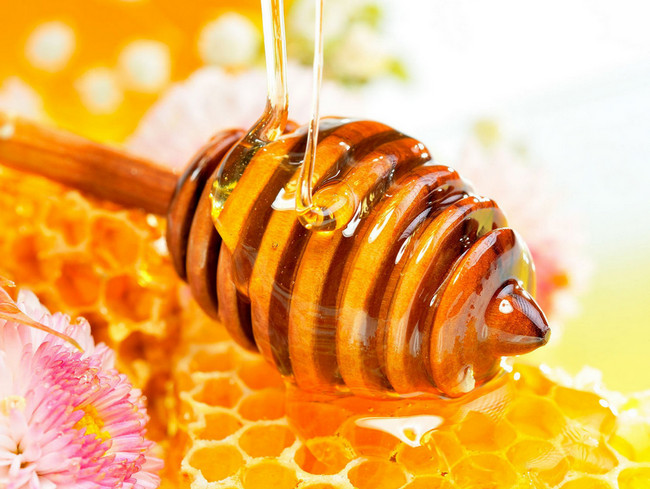
You can use folk remedies. But special attention should be paid to them. A common cold remedy is honey. But it can cause allergies in the mother or baby.
During illness, relatives should be more attentive to the nursing mother and more often give her the opportunity to rest.
The best way out when breastfeeding is to see a doctor. He will prescribe treatment, advise on drugs that are not dangerous for breastfeeding, and establish the required dosage.
Medication rules
Before taking any medications, you should carefully study the annotation to them. Each remedy has a period of highest concentration in the patient's blood. It is necessary to distribute medication so that this period is as far as possible in time from feeding.
Residues of drugs will inevitably enter the child's blood. But the disadvantages of their effects are incomparable with the complete cessation of lactation.
If ARVI is very difficult, it is still better to stop breastfeeding, but for a while. Transfer the child to artificial feeding, but continue to pump continuously. In this case, you should not give the baby a bottle with the mixture. From there, food comes in much easier than from the chest. After a period of temporary cessation of feeding, the baby can refuse breast milk.
Breastfeeding is a means of increasing immunity and the best source of a complex of nutrients for a child.
ARVI treatment should not be a reason for stopping it. Compliance with the rules will help you survive the period of illness while breastfeeding without complications and harm to the baby.
For the value of breast milk and what diet should be followed while breastfeeding, watch the video.
What drugs are suitable for the treatment of ARVI in nursing mothers?
How to treat ARVI for a nursing mother is not such a difficult question. The drugs approved for use with breastfeeding are quite enough. I have made a short list where the medications are categorized by symptom:
At a temperature. Paracetamol (Panadol) is officially approved for lactation. Only 0.1-0.2% of the dose is passed into milk. Ibuprofen (Nurofen) is not prohibited, however, it should be used only if Paracetamol is ineffective, since it is less studied in the treatment of ARVI in nursing mothers.
When coughing. For better sputum separation, Ambroxol, Acetylcysteine \u200b\u200band Bromhexine are allowed. In pharmacies, they can be called differently: Lazolvan, Haliksol, Ambrobene, ACC, etc. It is better to choose tablets, as syrups contain a lot of sugar, colors and flavors. Allowed herbal preparations based on the herb Thermopsis ("Cough", "Thermopsol"). Codelac, Codelak Broncho are prescribed with caution only with a dry, painful cough and only a doctor should do this. In the treatment of acute respiratory viral infections in nursing mothers, herbal preparations and decoctions have proven themselves well: Breast collection (No. 1, 2, 3, 4), infusion of lemon balm, anise, marshmallow, linden, raspberry leaves and twigs. They have an expectorant effect and increase milk separation.
With a runny nose. Start by rinsing your nose saline or sea water (preparations Aqualor, Aqua Maris, Salin, Fluimarin, etc.), make sure that the humidity in the room is 60% or more. If the congestion does not go away, then how to treat ARVI for a nursing mother with a cold? Use oxymetazoline in children's concentrations (Nazivin 0.01%) or Nazol Baby. If it does not help, funds for adults are also suitable: Otrivin, Afrin, Galazolin, Xymelin. The main thing is not to exceed the dose indicated in the instructions.
For sore throat. Rinsing with soda, salt, chamomile, calendula, as well as pharmaceutical solutions of Chlorhexidine, Furacillin, Miramistin, Chlorophyllipt and Rotokan are not contraindicated. Avoid products containing iodine (Jox, Lugol's solution), hard candy with a strong flavor and aroma. They well activate local immunity in the throat of Lizobakt, Imudon pastilles.
If ARVI does not go away, and the doctor has prescribed antibacterial drugdo not be afraid. Flemoxin, Sumamed and other drugs from the group of penicillins, cephalosporins and macrolides are officially allowed during lactation.
General rules of conduct for ARVI during lactation.
All SARS are transmitted through the air. Therefore, the mother must wear a mask so as not to infect the child. Do not stop breastfeeding! The virus is not transmitted with milk, but antibodies that help to defeat colds and strengthen immunity are transmitted.
You should not transfer the baby to formula while the mother is sick - this will not benefit the baby, on the contrary, it will deprive him of additional protection.
Drink plenty of fluids (about 2.5 liters per day) to quickly remove the toxins formed in the body during ARVI. Do not add honey, raspberries or other allergy-causing substances to drinking water. They easily pass into breast milk.
The common cold is not as dangerous as acute respiratory infections. In order not to harm the body of a young mother and her child, you need to know how to treat ARVI while breastfeeding.
Treatment of ARVI during breastfeeding should be correct so as not to harm the mother and child
Every year, or even several times a year, almost all of us fall ill with respiratory diseases. The nose is flowing, there is a cough, sneezing. But there is a misconception that colds and ARVI, ARI are one and the same disease. An incorrect comparison entails an inadequate approach to the treatment of the disease, with the consequent complications. This is especially true for risk groups, which include small children, the elderly, and pregnant women. SARS in a nursing mother also requires special attention, since the condition of the newborn baby depends on this. Therefore, it makes sense to find out the differences between various conditions, their nature of occurrence and the main symptoms, and at the same time, remember what is possible with ARVI for a nursing mother.
Causes of ARVI and colds
SARS is a number of respiratory diseases, which include influenza. Infection occurs by airborne droplets, those who have not been immunized are especially susceptible, have weak immunity. The body's defenses, in turn, are weakened due to many factors, which include chronic diseases, undergone operations, bad habits, unhealthy diet, etc. The most optimal air temperature for the spread of infection is from -5 to 5 degrees. It is in such an atmosphere that viruses rapidly multiply and penetrate the lactation mucosa, for the elimination of which adequate treatment of ARVI during lactation is required.
A cold is manifested due to hypothermia, low immunity. But at the same time, pathogenic microorganisms do not penetrate into the body, but internal ones are activated, which are mandatory in the body of every person. There is a cough, sore throat, etc. The disease does not pose a threat of powerful intoxication, the culprit of which is the acquired virus. As a treatment, you can use folk remedies, a course of multivitamins.
Pathogenesis of ARVI
After the penetration of pathogenic microorganisms onto the mucous membrane through airways, in rare cases, through the conjunctiva, viruses firmly settle in the larynx, nose, etc. They penetrate deep into the epithelium, then into the bloodstream and gain access to internal organs. The main symptoms appear:
- myalgia - aches in muscles, joints;
- fever;
- sore throat.
A respiratory infection is often not detected immediately, since first of all viruses multiply, after 2-3 days a person has the following symptoms:
- heat;
- sore throat;
- runny nose, sneezing;
- headache;
- dry, excruciating cough.
Decay products from parts of healthy cells and viruses, entering the bloodstream, cause additional unpleasant symptoms:
- nausea;
- vomiting.
In rare cases, pathogenic microorganisms invade the intestinal cavity, causing intense inflammation. The patient is accompanied by diarrhea, cramps in the stomach, complete loss of appetite.
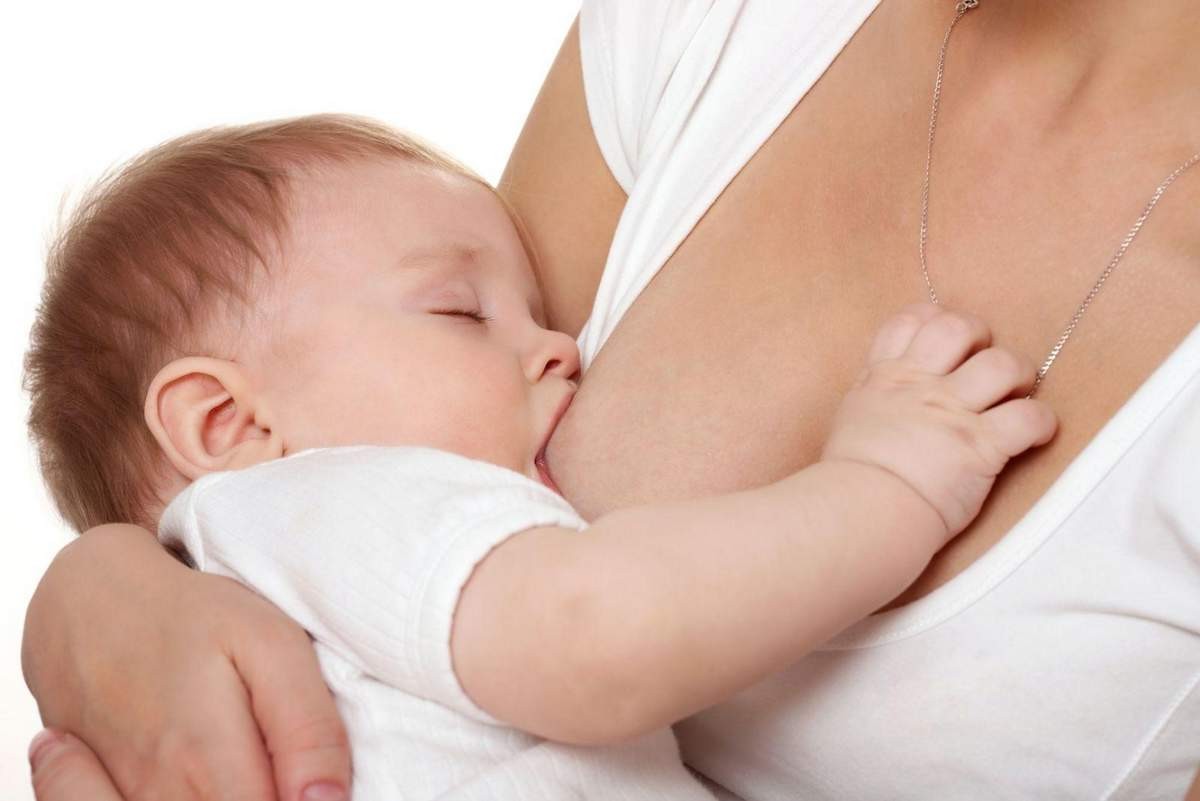
The body of a nursing mother is subject to stress even without illness
SARS in a nursing woman
A young mother who is breastfeeding is already exposed to stress, including respiratory system... When producing milk, the body introduces into it specific enzymes that help protect the baby from diseases and promote its development. A woman is very susceptible to infection, but with adequate treatment, the disease does not represent a particular danger. But for a baby who receives everything vital from the mother's body, breastfeeding with ARVI without following the recommendations can cause serious damage.
In a young mother, the disease proceeds in three stages:
- The virus enters the body. The first signs appear after 2-3 days, there is a fever, high temperature, sore throat, watery eyes, runny nose.
- Approximately 2-3 days after the first signs of the disease, the immune system develops a response - interferon, which destroys bacterial colonies.
- After 7-10 days, the recovery period begins. The sense of smell returns, a surge of energy is felt, the pains go away, the temperature is normalized. If there are no such symptoms, complications have arisen in the body due to a viral infection.
Important: as for babies, they have not yet developed immunity. Children under 6 months receive valuable components that strengthen the defense mechanisms through mother's milk, which cannot be said about bottle-fed babies. Therefore, it is important not to wean the baby from the mother's breast for as long as possible.
ARVI treatment with breastfeeding
Treatment for a nursing mother should be individualized. But there is an iron rule: at the first signs of the disease, you should immediately consult a doctor. So, how to treat ARVI for a nursing mother at home, what measures to take:
- Drink at least 2 liters of warm drink - milk, water, herbal teas, fruit drinks, juices. When intoxicated and attacked by viruses, the body loses a large amount of fluid, so it is important to normalize the water balance. Fever, high temperature causes dryness of the mucous membrane, due to the consumption of fluid, the respiratory tract is moistened, the sputum is diluted. Toxins are removed from the body in various ways, including sweat.
- Treatment of influenza and ARVI during breastfeeding involves rest and bed rest. Do not neglect the recommendations of doctors, you should limit your activity. Human body in acute respiratory infection loses strength, and in order to continue the fight against viruses, they must be accumulated. Peace, silence, staying in a warm bed will save and accumulate energy.
- At high temperatures, intoxication, loss of appetite occurs. It is impossible to force the patient to eat, especially since the pain in the throat interferes with swallowing, the sense of smell and sense of taste are lost. Food is replaced by a warm drink of compotes, fruit drinks, juices, which contain no less useful substances. Warm chicken broth, which contains components valuable for recovery, is suitable as a complete food. Liquid cereals, mashed potatoes will not be superfluous.
- Clean room. The room in which the sick person is located should be periodically ventilated and humidified. In dry, stagnant air, viruses feel "great" and multiply, and the infected person again inhales pathogens.

A nursing mother needs to drink at least 2 liters of warm liquid per day.
Treatment of a nursing mother with ARVI
The above measures are included in the complex therapy. In the treatment of acute respiratory viral infections with hepatitis B, antiviral drugs are indicated. The prescription of medicines provides for a list in which there are only those names that will not harm the health of the mother and her baby.
Important: it is a big mistake to use antibiotics in the treatment of a viral infection. The components of such funds are not able to act on the aggressive and powerful forces of pathogenic microorganisms. Antibiotics for nursing mothers with ARVI are prescribed by the attending physician on an individual basis to eliminate complications - pneumonia, bronchitis, tracheitis, etc.
An important point is the protection of the child's body from the attack of viruses. If the mother of the baby is sick with ARVI, a number of precautions must be taken:
- Is it possible to breastfeed with ARVI - yes, this is a mandatory task, the useful ingredients of milk will keep the baby's immunity at the proper level.
- Wash your hands constantly, as the infection passes not only through the air, but also dirty hands and face. With ARVI, everyone uses handkerchiefs, which they touch with their hands anyway.
- Wear a cotton-gauze bandage or mask to eliminate the risk of infection of the baby when breathing, coughing, sneezing. Wearing an object not only in contact with the baby, but also at the rest of the time, thus, the concentration of viruses in the air will be minimized.
Important: with a strong deterioration in a woman's condition, a feeling of heaviness, weakness, high temperature, fever, it is difficult to care for a child. In such cases, the help of loved ones is important, who must take care of the baby.
Treatment of ARVI with breastfeeding: drugs
Compliance with the recommendations of doctors is just part of the therapy, in which the body is strengthened, immunity is increased. In addition, it is necessary to consume ARVI medications during breastfeeding of a certain type, aimed at eliminating symptoms and eliminating viruses.

Treatment of ARVI in a nursing mother should be prescribed by a qualified doctor
SARS in a nursing mother: treatment with antiviral agents
There are a lot of drugs on the shelves of pharmacies, in the variety of which it is easy to get lost and confused. A young mother should be especially picky, the treatment of ARVI when feeding a child provides for certain names of drugs, incorrect selection can harm the child.
Prohibited drugs include Remantadin, Ribovirin, Arbidol. Homeopathic medicines such as Aflubin, Anaferon are not highly effective, they can cause allergic reactions in the body. Some of the best drugs are those that contain recombinant human alpha interferon. Treatment of ARVI while breastfeeding with the indicated names is prescribed only by the attending physician, since the schedule and doses provide an individual approach.
ARVI treatment during lactation: we fight a cold
With intoxication, swelling of the mucous membrane occurs, for this reason there is a runny nose, sore throat, difficult breathing. To free the airways, vasoconstrictor drugs are prescribed - sprays, drops.
There are a lot of names that can be safely used by both nursing mothers and small children:
- on the basis of Naphazoline: Naphtizin, Sanorin - short-acting;
- based on xylometazoline: Ximilan, Otrivin - medium-term action.
- based on oxymetazoline: Noxprey, Nazol, acting for 12 hours.
How to treat ARVI in a nursing mother: lowering the temperature
Any respiratory illness causes a rise in temperature. If the mark does not rise, then the immune forces are so weak that they are not able to fight viruses. It is not worth bringing down the indicators to the 38.5 mark. Thus, the body with its immunity attacks pathogenic microorganisms, concentrates its forces on the fight against symptoms. In cases where the indicators are above 38.5, antipyretic drugs are required. For a nursing mother, drugs are prescribed to lower the temperature: ibuprofen, paracetamol. But the drugs must be pure. Diluted, that is, a combination of antipyretics with other components: Teraflu, Flukold can cause allergic reactions and dangerous side effects in the infant's body.
How to treat ARVI during lactation: relieving sore throat
To minimize the risk of taking heavy drugs for an infant's body, it is better to use local means of exposure. The safest drugs for ARVI during lactation of liquid with the inclusion of antiseptic components: Iodinol, Lugol, Hexoral.
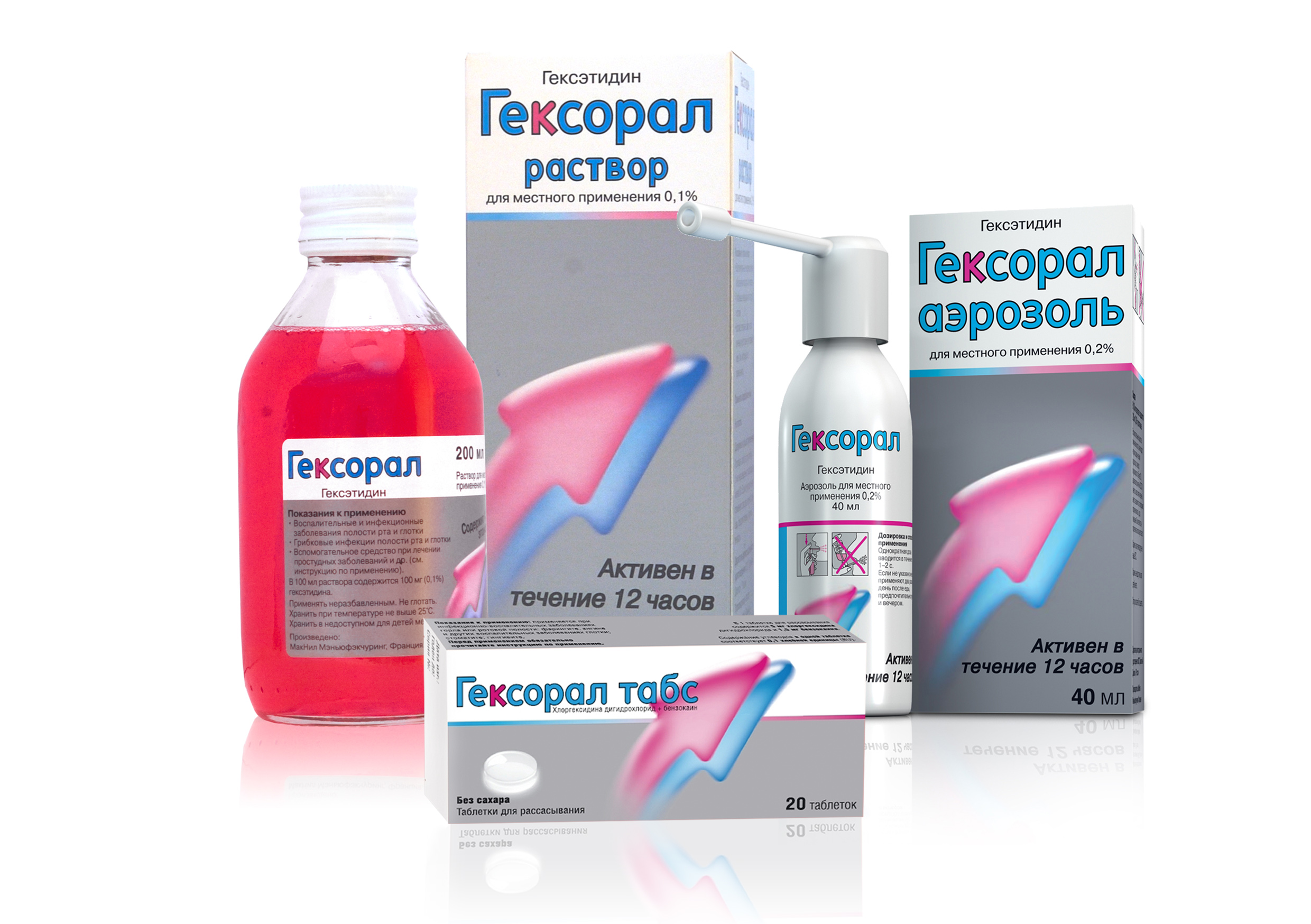
Hexoral is considered safe and at the same time effective drug for the treatment of ARVI during lactation
An excellent effect is produced by rinsing at home. Pour 3 drops of iodine into a glass of almost hot water, add 1 teaspoon of salt and baking soda. Rinse 5 times a day.
To get rid of sore throat, lozenges are used, which contain antiseptic and analgesic components: Strepsils, Falimint, in the form of sprays: Cameton, Chlorophyllipt.
Important: before starting treatment for ARVI while breastfeeding, you must clearly understand: take any drug only as directed by a doctor, having previously agreed on the dose and schedule.
Prevention of ARVI in a nursing mother
Despite the fact that the young mother does not have a lot of free time, still take care of preventive measures she needs. It is necessary to follow the elementary rules included in the complex of ARVI prevention during breastfeeding, in which immunity is strengthened and the chances of infection with acute respiratory diseases are minimized.
- No one forbids nursing mothers to lead a healthy lifestyle, to play sports. You can choose half an hour, an hour a day to go jogging, swimming, yoga, gymnastics.
- Drink plenty of fluids. Not only is water directly related to the formation of milk in the glands, it also strengthens the body by purifying it. With liquid, be it juice, fruit drink, compote, herbal tea, toxins, toxins are removed, metabolism and metabolic processes are improved. Scientists have long established that the immune system is formed in the digestive tract, and the fluid regulates the optimal microflora, which means that the defenses will be in perfect order.
- Fresh air. By nature itself it is prescribed for a young woman to walk with a stroller in the open air, useful for both her and her baby. Firstly, this is movement, activity, which already has a beneficial effect on the mother's body, strengthens the tone. Secondly, easy walks bring positive, invigorate, energize.
- Healthy eating. Yes, when breastfeeding, you have to choose foods so that the baby does not have colic, allergies, diathesis. But you shouldn't give up steamed vegetables, healthy purees and cereals.
- Prevention of influenza and SARS during breastfeeding involves hardening. Strengthening the immune system should start with warm seasons, preferably in summer. Start hardening with a contrast shower, then pour over cold water every morning. Increase energy, vivacity, tone increases, blood circulation increases.
- To refuse from bad habits. Everyone understands perfectly well that a smoking, drinking mother has no right to breastfeed her baby. But still, there are times when a woman does not behave quite right. Nicotine, alcohol directly impair the work of internal organs, the liver, kidneys, lungs, which are directly involved in cleansing and blood formation, suffer. Toxins enter breast milk, then into the baby's body.

A nursing mother needs to take special care of her health and the health of her baby.
It is important to protect and take care of a young mother, not to mention her baby.... After giving birth, a woman undergoes hormonal changes, she is tormented by depression, confusion, fear, especially if she is a first-born. Relatives should monitor her psychological state, help in everything, surround with love. The slightest disturbance or breakdown can cause milk loss, stress, and the mother's condition immediately affects the health of her child.

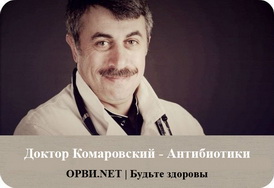 Antibiotics, Komarovsky is sure of this, are needed for many diseases that cannot be dealt with without them. The most important thing to remember for parents is that antibiotics have absolutely no effect on viruses, they are not used to treat ARVI ...
Antibiotics, Komarovsky is sure of this, are needed for many diseases that cannot be dealt with without them. The most important thing to remember for parents is that antibiotics have absolutely no effect on viruses, they are not used to treat ARVI ...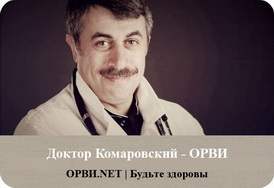 Viral diseases happen to everyone, to adults and children, and in such a situation it is good to be guided by the advice of a good doctor such as Yevgeny Komarovsky. The authority of this experienced pediatrician is beyond doubt ...
Viral diseases happen to everyone, to adults and children, and in such a situation it is good to be guided by the advice of a good doctor such as Yevgeny Komarovsky. The authority of this experienced pediatrician is beyond doubt ...